Unit 1 Friendship-Gramma
文档属性
| 名称 | Unit 1 Friendship-Gramma |
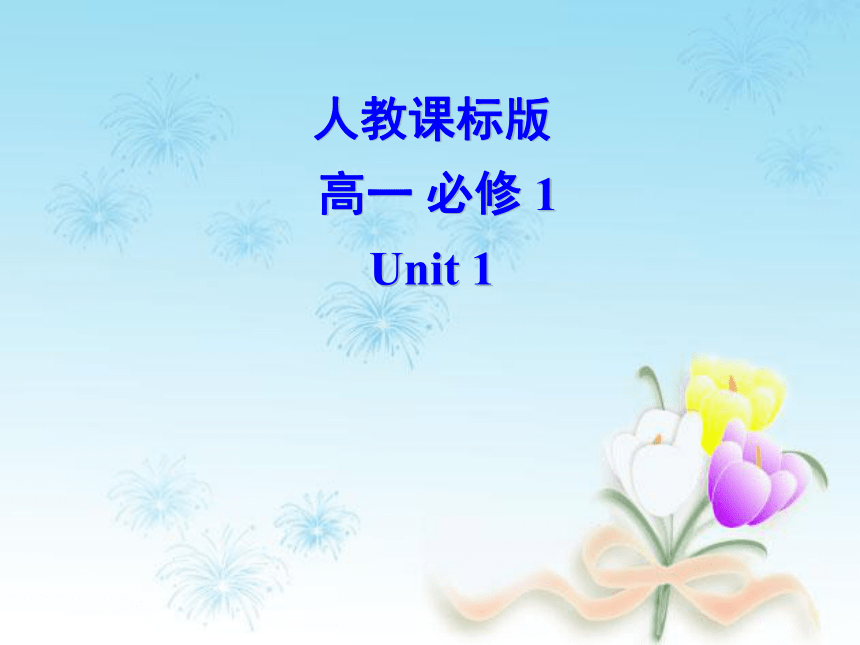
|
|
| 格式 | rar | ||
| 文件大小 | 2.2MB | ||
| 资源类型 | 教案 | ||
| 版本资源 | 人教版(新课程标准) | ||
| 科目 | 英语 | ||
| 更新时间 | 2011-12-06 00:00:00 | ||
图片预览

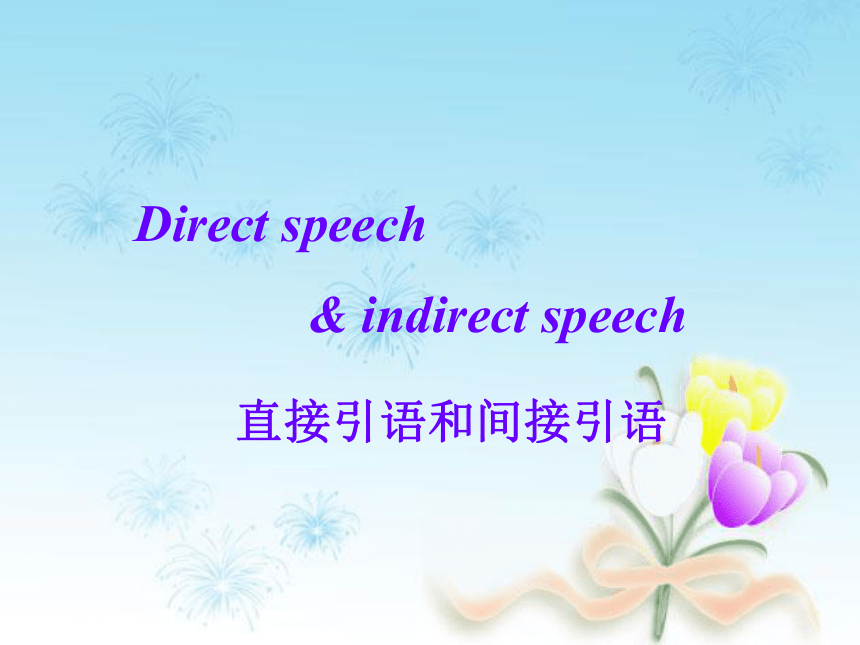
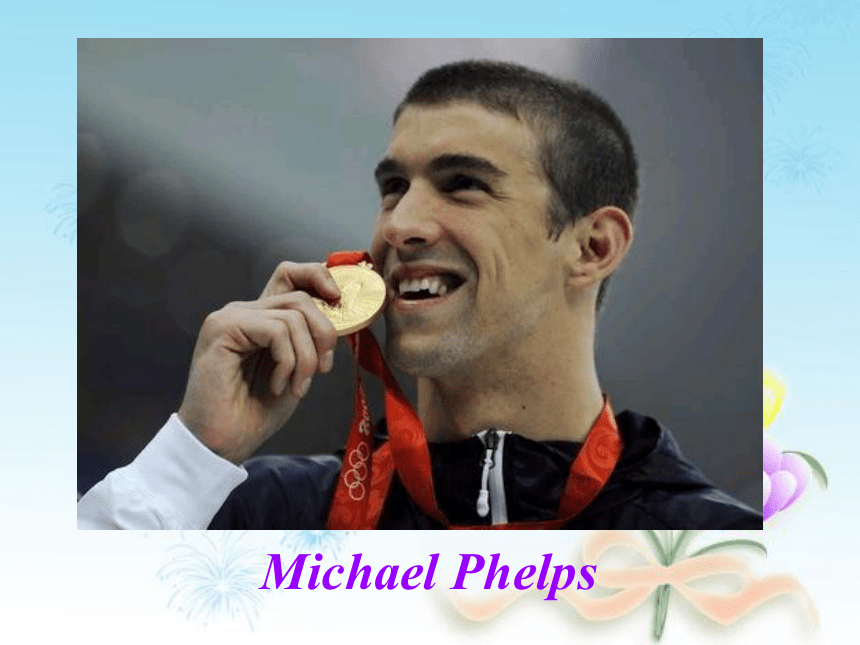
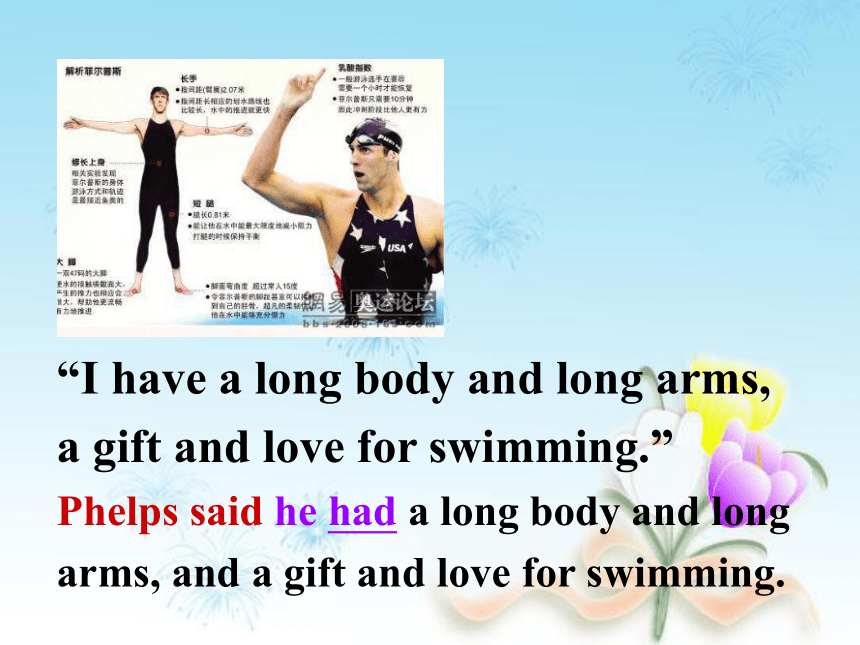
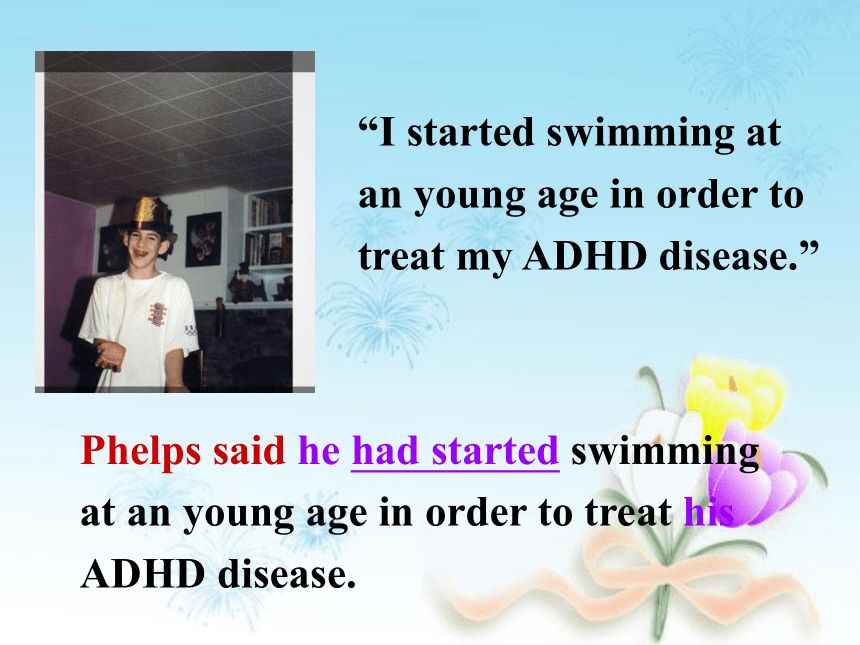
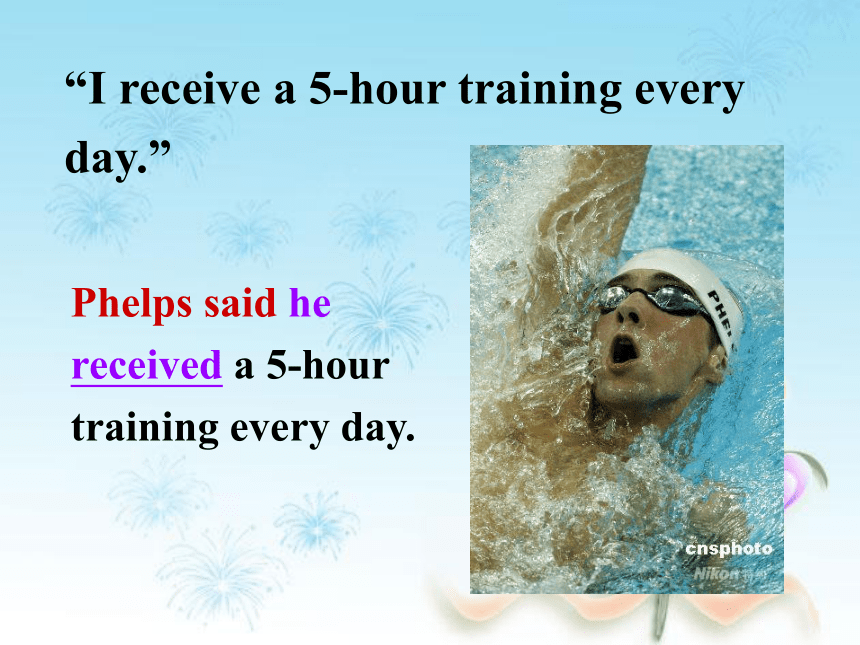
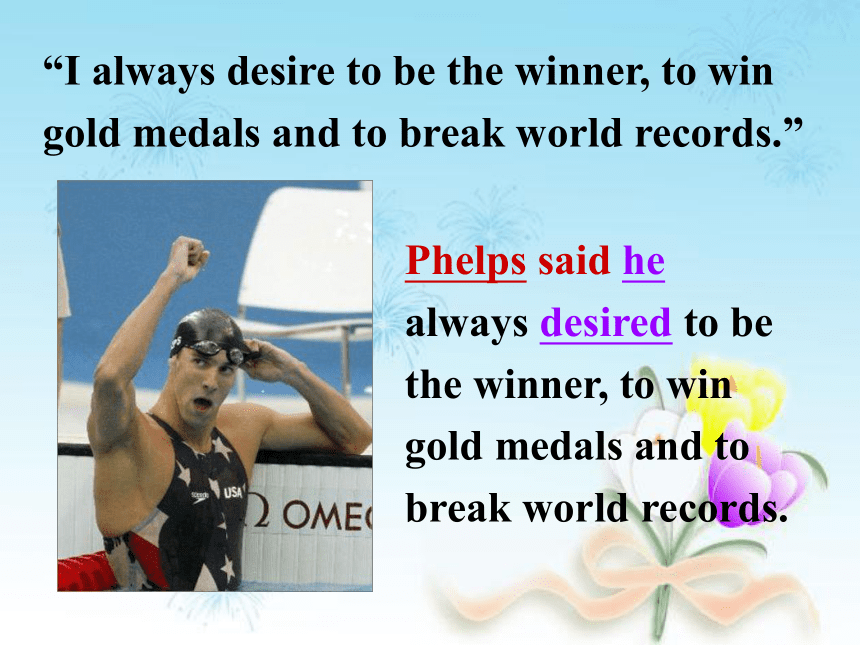
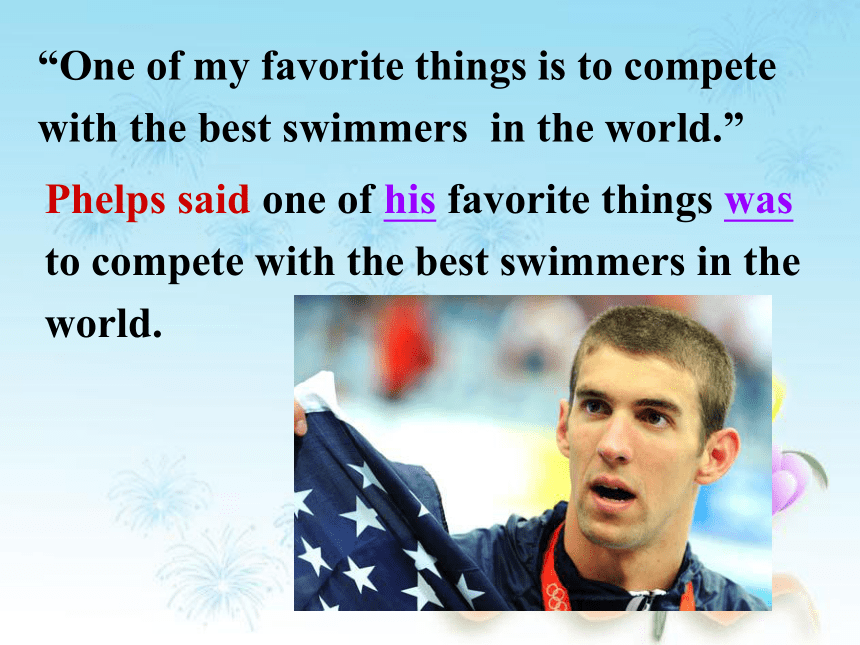
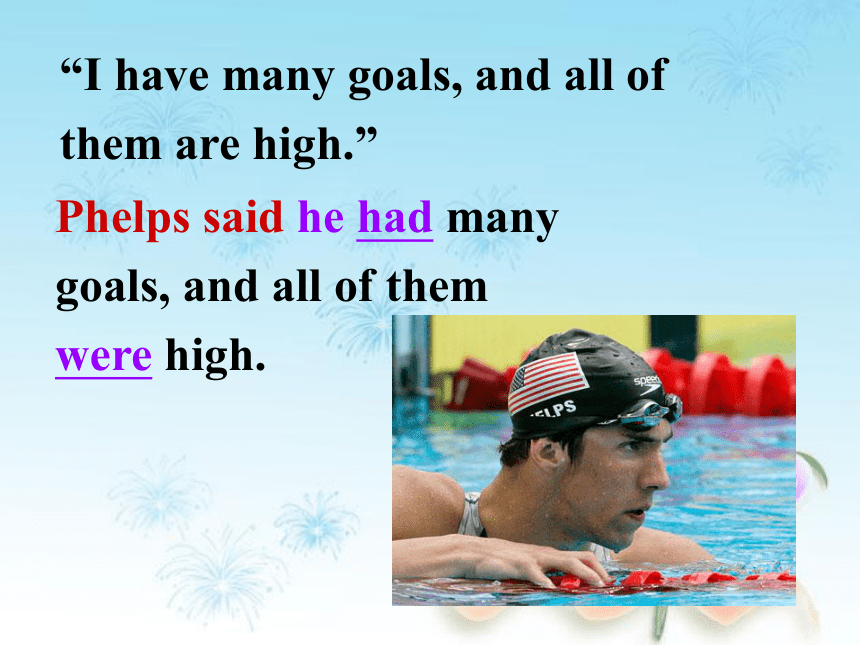
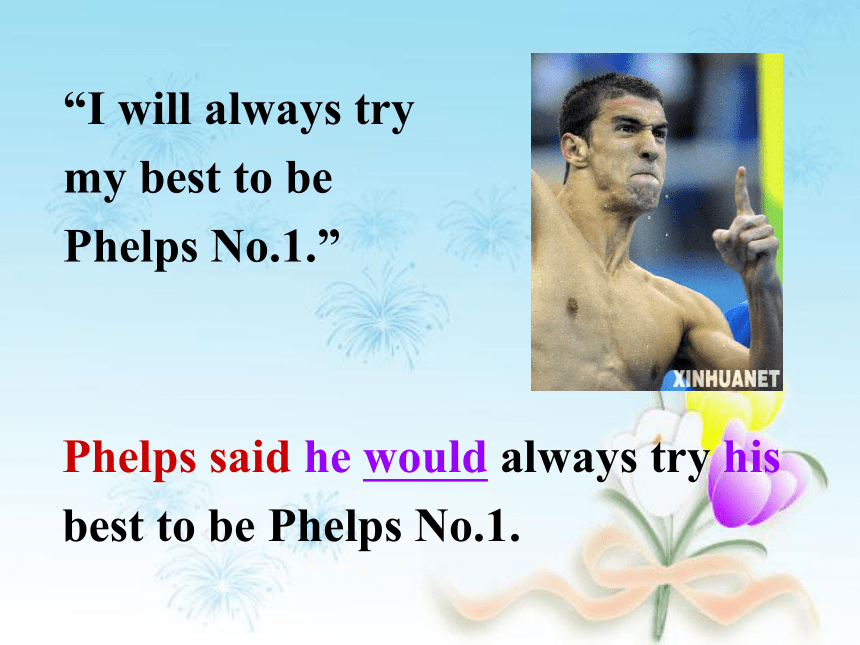

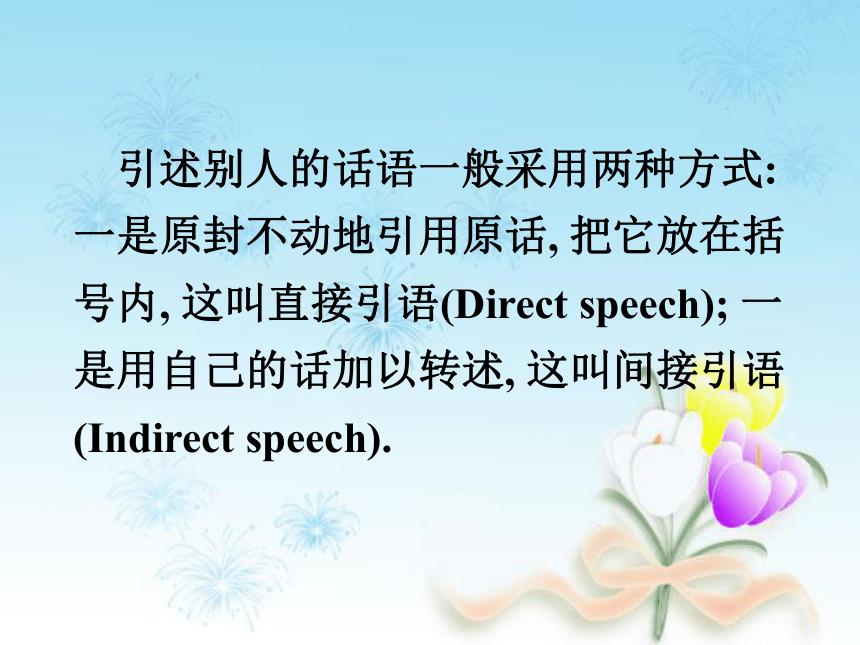
文档简介
(共51张PPT)
人教课标版
高一 必修 1
Unit 1
Direct speech
直接引语和间接引语
& indirect speech
Michael Phelps
“I have a long body and long arms, a gift and love for swimming.”
Phelps said he had a long body and long arms, and a gift and love for swimming.
“I started swimming at an young age in order to treat my ADHD disease.”
Phelps said he had started swimming at an young age in order to treat his ADHD disease.
“I receive a 5-hour training every
day.”
Phelps said he received a 5-hour training every day.
“I always desire to be the winner, to win gold medals and to break world records.”
Phelps said he always desired to be the winner, to win gold medals and to break world records.
“One of my favorite things is to compete with the best swimmers in the world.”
Phelps said one of his favorite things was to compete with the best swimmers in the world.
“I have many goals, and all of them are high.”
Phelps said he had many goals, and all of them were high.
“I will always try my best to be Phelps No.1.”
Phelps said he would always try his best to be Phelps No.1.
Secrets of Phelps’ success
gift
interest
determination
courage
hard work
ambition
……
引述别人的话语一般采用两种方式:一是原封不动地引用原话, 把它放在括号内, 这叫直接引语(Direct speech); 一是用自己的话加以转述, 这叫间接引语(Indirect speech).
直接引语 (变化前) 间接引语(变化后)
陈述句
Jane said, “I’m very fond of traveling.”
that引导的宾语从句
Jane said that she was very fond of traveling.
直接引语 (变化前) 间接引语(变化后)
一般疑问句
“Is this your umbrella, Mary ” asked John.
whether/if 引导的宾语从句
John asked Mary if that was her umbrella.
直接引语 (变化前) 间接引语(变化后)
特殊疑问句
“Mary, when will you return me the book ” asked John.
wh-词引导的宾语从句
John asked Mary when she would return him the book.
由直接引语转变为间接引语,有时会引时态的变化, 注意以下几个方面:
直接引语(变化前) 间接引语(变化后)
主句动词为一般现在时或现在完成时
She often says, “All men and women are equal under the law.”
从句动词时态不变
She often says that all men and women are equal under the law.
直接引语(变化前) 间接引语(变化后)
主句动词为一
般过去时 引导动词为: 从句动词时态相应变化 从句动词变为:
一般现在时
“I know it,” he said.
一般过去时
He said that he knew it.
直接引语(变化前) 间接引语(变化后)
主句动词为一
般过去时 引导动词为: 从句动词时态相应变化 从句动词变为:
现在进行时
“I’m making coffee for you all,” she said.
过去进行时
She said she was making coffee for us all.
直接引语(变化前) 间接引语(变化后)
主句动词为一
般过去时 引导动词为: 从句动词时态相应变化 从句动词变为:
现在完成时
“I have seen her before,” said he.
过去完成时
He said he had seen her before.
直接引语(变化前) 间接引语(变化后)
主句动词为一
般过去时 引导动词为: 从句动词时态相应变化 从句动词变为:
现在完成进行时
He said, “I have been doing it for hours.”
过去完成进行时
He said he had been doing it for hours.
直接引语(变化前) 间接引语(变化后)
主句动词为一
般过去时 引导动词为: 从句动词时态相应变化 从句动词变为:
一般过去时
“I saw her last Monday,” he said.
过去完成时
He said he had seen her the previous Monday.
直接引语(变化前) 间接引语(变化后)
主句动词为一
般过去时 引导动词为: 从句动词时态相应变化 从句动词变为:
过去进行时
“I was waiting for Jim,” she said.
过去完成进行时
She said she had been waiting for Jim.
直接引语(变化前) 间接引语(变化后)
主句动词为一
般过去时 引导动词为: 从句动词时态相应变化 从句动词变为:
过去完成时
“ Do you know Rick had been ill in bed for many days till he died ” Jack asked.
过去完成时
Jack asked if I knew Rick had been ill in bed for many days till he died.
直接引语(变化前) 间接引语(变化后)
主句动词为一
般过去时 引导动词为: 从句动词时态相应变化 从句动词变为:
一般将来时
He said: “We shall start tomorrow.”
过去将来时
He said they would start the next day.
直接引语变见解引语时, 时态要发生变化:
一般现在时
现在完成时
现在进行时
一般将来时
一般过去时
一般过去时
过去完成时
过去进行时
过去将来时
过去完成时
由直接引语转变为间接引语,下列情况时态不变:
1. 不变的真理
The teacher said to the students, “Water freezes when the temperature falls below 0℃.”
→ The teacher told the students that water freezes when the temperature falls below 0℃.
2. 经常的习惯:
He said to the doctor, “I smoke two packs every day.”
→ He told the doctor that he smokes two packs every day.
3. 历史事件:
The teacher said, “World War Ⅱ ended in 1945.”
→ The teacher said that World War Ⅱ ended in 1945.
4. 部分情态动词,如must, ought to, used to, had better等:
She said to me: “You must hurry up.”
→ She said that I must hurry up.
由直接引语转变为间接引语,下列代词、形容词、副词、动词等可能要变化。
直接引语 间接引语
this
these
now
ago
today
tomorrow
that/this
those/these
then
before
that day/today/yesterday
(the) next day
直接引语 间接引语
the day after tomorrow
yesterday
last night
the day before yesterday
go
bring
here
in two days’ time
the day before
the night before
two days before
come/go
bring/take
there/here
1. “I like reading adventure stories,” said John.
John said that he liked reading adventure stories.
2. “I don’t like computers,” Sarah said to her friend.
Sarah told her friends that she didn’t like computers.
Exercise I
3. “Ann, have you seen my blue notebook ” Peter asked.
Peter asked Ann if she had seen his blue notebook.
4. “How can you do that ” Mary said to Ann.
Mary asked Ann how she could do that.
5. “What difference does it make ” Peter asked Jim.
Peter asked Jim what difference it made.
1. Jack said to me, “You look worried today.”
Jack told me that ___ worried ___. A. he looks…today B. you look…today C. we looked…that day D. I looked…that day
Exercise II
2. We said to her, “They’re walking through the street now.”
We told her that ___ through the street ___. A. we were walking…then B. you are walking…now C .they were walking…then D. they walking…now
3. Mr Black said, “I have walked a long way this week.”
Mr Black said that __ a long way __. A. I had walked…last week B. he had walked…that week C. I walked…last week D. he has walked…this week
4. The man thought, “I shall take it back tomorrow.”
The man thought that __ take it back ____. A. I shall…tomorrow B. I shall…the next day C. he should…tomorrow D. he would …the next day
5. They said to us, “Are you afraid to leave this house ”
They asked us ____ afraid to leave _____ house. A. that were we…this B. that we were…that C. if were we …this D. if we were…that
6. Jane said, “What did he hear about a week ago ”
Jane asked ____ about _____. A. that he heard…a week ago B. what he had heard…the week before C. what he had herd… a week ago D. if he heard…the week ago
7. She asked, “Whose house will he break into next time ”
She asked whose house ____ break into _____. A. will he…next time B. would he…the next time C. he would…the next time D. he will…next time
8. Jack said to her, “Where do you spend your holidays ” Jack asked her where ____ holidays. A. she spent her B. you spend your C. she spend her D. you spent your
9. Black asked me, “ Why haven’t you left here yet ”
Black asked me why ____ yet. A. I hadn’t left there B. I haven’t left here C. hadn’t I left there D. haven’t I left here
10. The teacher asked her, “Does the sun rise in the east ”
The teacher asked her ___ the sun ___ in the east. A. if…rise B. if…rises C. whether…rose D. whether did …rise
把下列句子变为直接引语或间接引语。
“I don’t want to go there with Alice,” said Tom.
2. “Is your father kind to you ” she often asks me.
She often asks me whether / if my father is kind to me.
Tom said that he didn’t want to go there with Alice.
3. Mother asked me what I was going to be when I grew up.
4. “I have to study hard to make progress,” the girl said to her friend.
“What are you going to be when you grow up ” Mother asked me.
The girl told her friend that she had to study hard to make progress.
5. “When will you go back to work ” Mr. Smith asked.
Mr. Smith asked me when I would go back to work.
完成下列句子,将直接引语转
换为间接引语(每空一词)。
1.“It is really cold, but it is so nice to be out on the lake,” she said to me.
She ____ me that it ___ really cold, but it ___ so nice to be out on the lake.
told
was
was
2. “Did you ask your boss for a pay increase ” she asked the man.
She asked the man __ he ____ _____ ___ boss for a pay increase.
if
had
asked
his
3. The teacher asked the girl, “Why are
you crying here ”
The teacher asked the girl ____ ___ ____ crying ____.
4. “When will the plane take off ” I wondered.
I wondered _____ ___ _____ _____ ____ ___.
why she
was
there
when the plane would take
off
5. “Have you seen our plane yourself ” he asked the boy.
He asked the boy ______ __ ____ ____ ____ plane ______.
whether he had
seen their himself
人教课标版
高一 必修 1
Unit 1
Direct speech
直接引语和间接引语
& indirect speech
Michael Phelps
“I have a long body and long arms, a gift and love for swimming.”
Phelps said he had a long body and long arms, and a gift and love for swimming.
“I started swimming at an young age in order to treat my ADHD disease.”
Phelps said he had started swimming at an young age in order to treat his ADHD disease.
“I receive a 5-hour training every
day.”
Phelps said he received a 5-hour training every day.
“I always desire to be the winner, to win gold medals and to break world records.”
Phelps said he always desired to be the winner, to win gold medals and to break world records.
“One of my favorite things is to compete with the best swimmers in the world.”
Phelps said one of his favorite things was to compete with the best swimmers in the world.
“I have many goals, and all of them are high.”
Phelps said he had many goals, and all of them were high.
“I will always try my best to be Phelps No.1.”
Phelps said he would always try his best to be Phelps No.1.
Secrets of Phelps’ success
gift
interest
determination
courage
hard work
ambition
……
引述别人的话语一般采用两种方式:一是原封不动地引用原话, 把它放在括号内, 这叫直接引语(Direct speech); 一是用自己的话加以转述, 这叫间接引语(Indirect speech).
直接引语 (变化前) 间接引语(变化后)
陈述句
Jane said, “I’m very fond of traveling.”
that引导的宾语从句
Jane said that she was very fond of traveling.
直接引语 (变化前) 间接引语(变化后)
一般疑问句
“Is this your umbrella, Mary ” asked John.
whether/if 引导的宾语从句
John asked Mary if that was her umbrella.
直接引语 (变化前) 间接引语(变化后)
特殊疑问句
“Mary, when will you return me the book ” asked John.
wh-词引导的宾语从句
John asked Mary when she would return him the book.
由直接引语转变为间接引语,有时会引时态的变化, 注意以下几个方面:
直接引语(变化前) 间接引语(变化后)
主句动词为一般现在时或现在完成时
She often says, “All men and women are equal under the law.”
从句动词时态不变
She often says that all men and women are equal under the law.
直接引语(变化前) 间接引语(变化后)
主句动词为一
般过去时 引导动词为: 从句动词时态相应变化 从句动词变为:
一般现在时
“I know it,” he said.
一般过去时
He said that he knew it.
直接引语(变化前) 间接引语(变化后)
主句动词为一
般过去时 引导动词为: 从句动词时态相应变化 从句动词变为:
现在进行时
“I’m making coffee for you all,” she said.
过去进行时
She said she was making coffee for us all.
直接引语(变化前) 间接引语(变化后)
主句动词为一
般过去时 引导动词为: 从句动词时态相应变化 从句动词变为:
现在完成时
“I have seen her before,” said he.
过去完成时
He said he had seen her before.
直接引语(变化前) 间接引语(变化后)
主句动词为一
般过去时 引导动词为: 从句动词时态相应变化 从句动词变为:
现在完成进行时
He said, “I have been doing it for hours.”
过去完成进行时
He said he had been doing it for hours.
直接引语(变化前) 间接引语(变化后)
主句动词为一
般过去时 引导动词为: 从句动词时态相应变化 从句动词变为:
一般过去时
“I saw her last Monday,” he said.
过去完成时
He said he had seen her the previous Monday.
直接引语(变化前) 间接引语(变化后)
主句动词为一
般过去时 引导动词为: 从句动词时态相应变化 从句动词变为:
过去进行时
“I was waiting for Jim,” she said.
过去完成进行时
She said she had been waiting for Jim.
直接引语(变化前) 间接引语(变化后)
主句动词为一
般过去时 引导动词为: 从句动词时态相应变化 从句动词变为:
过去完成时
“ Do you know Rick had been ill in bed for many days till he died ” Jack asked.
过去完成时
Jack asked if I knew Rick had been ill in bed for many days till he died.
直接引语(变化前) 间接引语(变化后)
主句动词为一
般过去时 引导动词为: 从句动词时态相应变化 从句动词变为:
一般将来时
He said: “We shall start tomorrow.”
过去将来时
He said they would start the next day.
直接引语变见解引语时, 时态要发生变化:
一般现在时
现在完成时
现在进行时
一般将来时
一般过去时
一般过去时
过去完成时
过去进行时
过去将来时
过去完成时
由直接引语转变为间接引语,下列情况时态不变:
1. 不变的真理
The teacher said to the students, “Water freezes when the temperature falls below 0℃.”
→ The teacher told the students that water freezes when the temperature falls below 0℃.
2. 经常的习惯:
He said to the doctor, “I smoke two packs every day.”
→ He told the doctor that he smokes two packs every day.
3. 历史事件:
The teacher said, “World War Ⅱ ended in 1945.”
→ The teacher said that World War Ⅱ ended in 1945.
4. 部分情态动词,如must, ought to, used to, had better等:
She said to me: “You must hurry up.”
→ She said that I must hurry up.
由直接引语转变为间接引语,下列代词、形容词、副词、动词等可能要变化。
直接引语 间接引语
this
these
now
ago
today
tomorrow
that/this
those/these
then
before
that day/today/yesterday
(the) next day
直接引语 间接引语
the day after tomorrow
yesterday
last night
the day before yesterday
go
bring
here
in two days’ time
the day before
the night before
two days before
come/go
bring/take
there/here
1. “I like reading adventure stories,” said John.
John said that he liked reading adventure stories.
2. “I don’t like computers,” Sarah said to her friend.
Sarah told her friends that she didn’t like computers.
Exercise I
3. “Ann, have you seen my blue notebook ” Peter asked.
Peter asked Ann if she had seen his blue notebook.
4. “How can you do that ” Mary said to Ann.
Mary asked Ann how she could do that.
5. “What difference does it make ” Peter asked Jim.
Peter asked Jim what difference it made.
1. Jack said to me, “You look worried today.”
Jack told me that ___ worried ___. A. he looks…today B. you look…today C. we looked…that day D. I looked…that day
Exercise II
2. We said to her, “They’re walking through the street now.”
We told her that ___ through the street ___. A. we were walking…then B. you are walking…now C .they were walking…then D. they walking…now
3. Mr Black said, “I have walked a long way this week.”
Mr Black said that __ a long way __. A. I had walked…last week B. he had walked…that week C. I walked…last week D. he has walked…this week
4. The man thought, “I shall take it back tomorrow.”
The man thought that __ take it back ____. A. I shall…tomorrow B. I shall…the next day C. he should…tomorrow D. he would …the next day
5. They said to us, “Are you afraid to leave this house ”
They asked us ____ afraid to leave _____ house. A. that were we…this B. that we were…that C. if were we …this D. if we were…that
6. Jane said, “What did he hear about a week ago ”
Jane asked ____ about _____. A. that he heard…a week ago B. what he had heard…the week before C. what he had herd… a week ago D. if he heard…the week ago
7. She asked, “Whose house will he break into next time ”
She asked whose house ____ break into _____. A. will he…next time B. would he…the next time C. he would…the next time D. he will…next time
8. Jack said to her, “Where do you spend your holidays ” Jack asked her where ____ holidays. A. she spent her B. you spend your C. she spend her D. you spent your
9. Black asked me, “ Why haven’t you left here yet ”
Black asked me why ____ yet. A. I hadn’t left there B. I haven’t left here C. hadn’t I left there D. haven’t I left here
10. The teacher asked her, “Does the sun rise in the east ”
The teacher asked her ___ the sun ___ in the east. A. if…rise B. if…rises C. whether…rose D. whether did …rise
把下列句子变为直接引语或间接引语。
“I don’t want to go there with Alice,” said Tom.
2. “Is your father kind to you ” she often asks me.
She often asks me whether / if my father is kind to me.
Tom said that he didn’t want to go there with Alice.
3. Mother asked me what I was going to be when I grew up.
4. “I have to study hard to make progress,” the girl said to her friend.
“What are you going to be when you grow up ” Mother asked me.
The girl told her friend that she had to study hard to make progress.
5. “When will you go back to work ” Mr. Smith asked.
Mr. Smith asked me when I would go back to work.
完成下列句子,将直接引语转
换为间接引语(每空一词)。
1.“It is really cold, but it is so nice to be out on the lake,” she said to me.
She ____ me that it ___ really cold, but it ___ so nice to be out on the lake.
told
was
was
2. “Did you ask your boss for a pay increase ” she asked the man.
She asked the man __ he ____ _____ ___ boss for a pay increase.
if
had
asked
his
3. The teacher asked the girl, “Why are
you crying here ”
The teacher asked the girl ____ ___ ____ crying ____.
4. “When will the plane take off ” I wondered.
I wondered _____ ___ _____ _____ ____ ___.
why she
was
there
when the plane would take
off
5. “Have you seen our plane yourself ” he asked the boy.
He asked the boy ______ __ ____ ____ ____ plane ______.
whether he had
seen their himself
